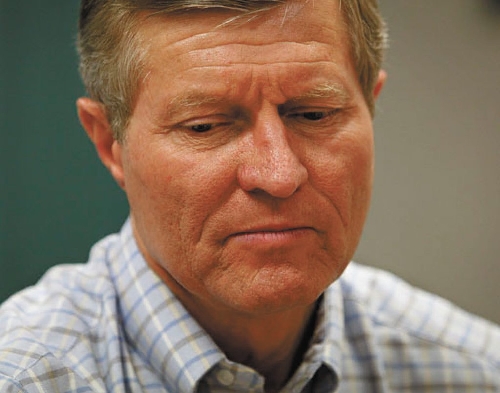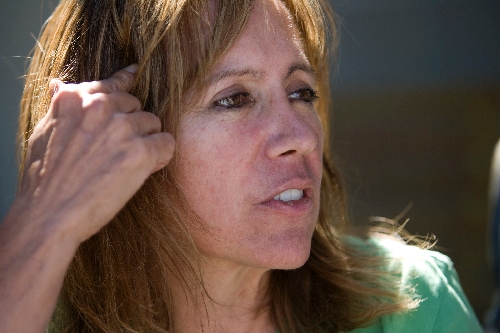Changes to coroner’s inquest system finalized
Changes to the much-criticized coroner's inquests were adopted Monday, although two dissenting county commissioners insist a key piece will hurt the system that probes killings by police.
Commissioners voted 5-2 to ratify the reforms, which include appointing counsel -- or an ombudsman -- to represent the dead suspect's family, disclosing investigative files before hearings and replacing jury verdicts with findings of fact.
Commissioners Steve Sisolak and Tom Collins voted no, mainly because they oppose creating ombudsmen.
Neither voiced their objections at Monday's meeting, but they have said that an ombudsman could turn a fact-finding session into a combative quasi-trial, discouraging officers from testifying.
That echoed the police union's criticism and threats.
Union officials say they will advise officers involved in deadly shootings to not testify at hearings or give statements to homicide investigators after the incidents.
"Now that somebody will be asking tough questions, they're going to refuse to participate," Maggie McLetchie, an attorney with the American Civil Liberties Union of Nevada, said after the meeting. "I think police accountability is as important as officers enforcing the law."
Chris Collins, executive director of the Las Vegas Police Protective Association, which represents 2,800 officers, couldn't be reached for comment Monday.
About a half-dozen inquests are pending, and the next one will take place in May or June, to give the county time to implement changes, Coroner Michael Murphy said.
"I want to commend the commission for moving forward," said Jose Solorio, a community activist who was part of the 10-person advisory panel that recommended the changes. "I think we will lead the nation."
Solorio said two of the upcoming cases involve Hispanic men who died at the hands of police.
They are Fernando Giovanni Sauceda, who was shot on New Year's Day by an officer who said he tried to disarm him, and Eduardo Lopez-Hernandez, who died Aug. 25 after Nevada Highway Patrol officers stunned him with electronic devices.
Lopez-Hernandez's death probably will be the next one reviewed at an inquest.
Newly sworn-in Commissioner Mary Beth Scow expressed concerns about police refusing to participate in inquests, saying it will hurt the fact-finding mission. Scow suggested reviewing the inquests later to see how the revamped system is working. Then she voted in favor of the overhaul, putting her vote in line with her predecessor, Rory Reid, an avid supporter of inquest reform.
Sheriff Doug Gillespie came up with the idea of an ombudsman to represent families instead of a private attorney. He also backs other changes, such as having representatives for the family and officers meet at two pre-inquest conferences.
At the meetings, investigative and homicide files will be disclosed to the affected parties. The parties will determine the scope of questioning at hearings with the aim of digging into what happened during a fatal incident.
Evie Oquendo, whose teenage son, Tanner Chamberlain, was fatally shot by police, said her inquest experience would have been much different if the new changes had been in effect.
Chamberlain held a knife to her throat during a bipolar episode. An inquest jury ruled the shooting justified.
Oquendo said she would have had access to the 911 recording, which authorities have denied her. She also would have had a chance to ask unanswered questions, such as why the officer shot her son before anyone had a chance to coax him into surrendering, she said.
"Yes, I think the outcome would've been different," Oquendo said. "I think it's great for future families. But what about me?"
Commissioners formed an advisory panel to suggest reforms after inquest juries found officers justified in two contentious cases: Trevon Cole and Erik Scott.
Cole, 21, a small-time marijuana dealer, was shot and killed by police while unarmed in his apartment.
Scott, 38, a medical device salesman and West Point graduate, was killed outside a Costco in Summerlin by officers who said he drew a gun.
In a statement, Scott's father, William, lambasted the police union's refusal to cooperate under the new system.
The union is acting like "a grade-school playground bully demanding that only his version of the fight be related to the principal," Scott wrote.
"When will the unions realize that those halcyon days of cops doing whatever they please -- and getting away with it -- are over?"
Scott said the state or county should approve rules that let officers invoke their constitutional right to not testify at hearings but also allow their bosses to fire them for insubordination.
Commissioners mostly discussed Monday how to select and pay the attorneys who would act as ombudsmen.
They set a $5,000 limit per inquest for an ombudsman. The attorney would be paid $1,000 a day during hearings and $300 a day for pre-inquest work.
They also accepted two of Gillespie's requests: A law enforcement official should sit on the board that vets ombudsmen, and ombudsmen should have at least 10 years of legal experience.
Requiring 10 years of experience concerned Commissioner Chris Giunchigliani, who worried it might encumber recruiting. But she signed off on it.
McLetchie disagreed with having a law enforcement official screening ombudsmen. Police do not have the background to know one attorney from another, she said, and they should not be involved in a process that is supposed to objectively review an officer's lethal actions.
She had other complaints but said she was willing to compromise. The police union should, too, instead of being recalcitrant, she said.
"They should not be able to veto the process," McLetchie said.
Contact reporter Scott Wyland at swyland@ reviewjournal.com or 702-455-4519.























